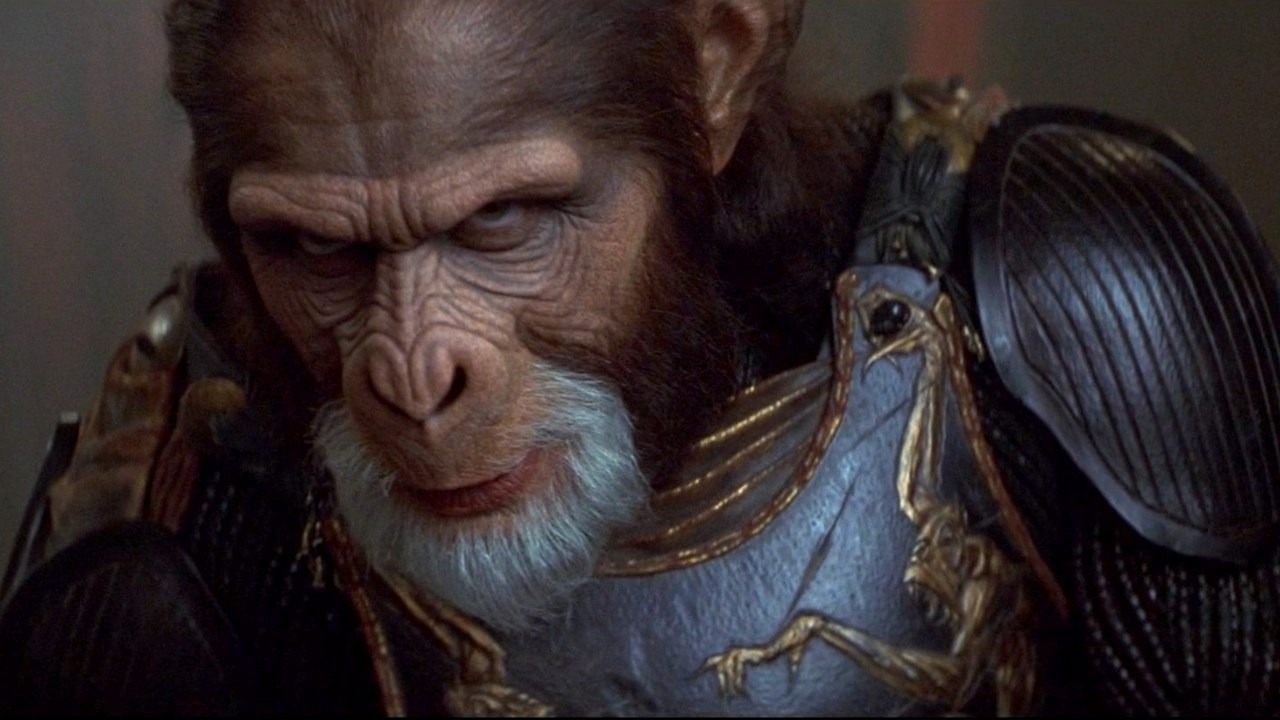Planet of the Apes (2001)

Planet of the Apes (2001), directed by Tim Burton, is a reimagining of the 1968 classic science fiction film of the same name. Known for its distinctive visual style and bold reinterpretation of the original film’s themes, Burton’s version of Planet of the Apes offers a fresh yet controversial take on the dystopian narrative. This essay explores the film’s thematic elements, character development, visual aesthetics, and its place within the broader context of science fiction cinema.
Planet of the Apes (2001) follows the story of astronaut Leo Davidson (Mark Wahlberg), who, while on a space mission, crash-lands on a mysterious planet inhabited by intelligent apes. The apes, who have established a highly stratified society, dominate the planet, with humans relegated to a subservient role. As Leo navigates this alien world, he discovers that the apes’ society is built on oppressive ideologies and confronts his own struggle for survival and freedom.
The film’s narrative unfolds with Leo’s efforts to uncover the truth behind the planet’s origins and to challenge the apes’ authoritarian rule. The climax reveals a dramatic twist that redefines the nature of the planet and the implications for Leo’s quest to return home.

A central theme in Planet of the Apes is the exploration of power dynamics and hierarchical structures. The film portrays a world where apes have risen to dominance, creating a social hierarchy reminiscent of the prejudices and power imbalances present in human societies. The apes’ control over the human population serves as an allegory for the ways in which power can be used to subjugate and dehumanize others.
The film examines the consequences of authoritarian rule through the apes’ governance. Characters such as General Thade (Tim Roth), who represents the apex of ape militaristic and oppressive power, exemplify the dangers of unchecked authority. Thade’s antagonistic role highlights the theme of resistance against tyrannical regimes and the struggle for freedom.
The characters in Planet of the Apes are designed to embody various aspects of the film’s thematic concerns. Leo Davidson’s character arc, from a confident astronaut to a rebel fighting for survival, underscores the theme of personal transformation and resilience. Leo’s journey reflects his internal struggle against the apes’ oppressive society and his quest for understanding and liberation.

The portrayal of the ape characters adds layers of moral complexity to the narrative. While Thade represents the epitome of cruelty and authoritarianism, characters like Ari (Helena Bonham Carter) and the wise chimpanzee scientist, Caesar (Paul Giamatti), offer alternative perspectives on ape society. Ari’s compassion and desire for reform challenge the established social order, revealing the potential for change and empathy within oppressive systems.
Tim Burton’s visual style is a defining feature of his adaptation of Planet of the Apes. The film employs a distinctive aesthetic, characterized by elaborate costume designs and a dark, atmospheric setting. The apes’ elaborate makeup and prosthetics, designed by Rick Baker, are a notable achievement in creating a believable and immersive alien world.
Burton’s use of color, lighting, and set design contributes to the film’s unique tone. The planet’s stark landscapes and the apes’ imposing architecture reflect the dystopian nature of the society. The film’s visual elements enhance the thematic concerns of the narrative, creating a visually striking and thematically resonant experience.

Planet of the Apes (2001) occupies a distinctive place in the science fiction genre, both as a remake and as a standalone work. While it draws inspiration from the 1968 film, Burton’s adaptation introduces new elements and thematic interpretations that set it apart. The film’s reimagining of the original narrative offers a fresh perspective on the apocalyptic and allegorical themes of the franchise.
The film’s reception was mixed, with some praising its visual achievements and thematic ambitions, while others criticized it for its deviations from the original story and perceived lack of coherence. Despite these critiques, Planet of the Apes remains a significant entry in the science fiction genre, reflecting Burton’s unique vision and contributing to the ongoing exploration of dystopian and allegorical narratives in cinema.

Planet of the Apes (2001) is a visually striking and thematically rich film that reimagines the classic science fiction narrative for a new generation. Through its exploration of power dynamics, hierarchical structures, and moral ambiguity, the film offers a thought-provoking commentary on authority and resistance. Tim Burton’s distinctive visual style and the film’s complex character development contribute to its place within the broader context of science fiction cinema. While its reception may be divided, Planet of the Apes remains a notable work for its ambitious reinterpretation of a timeless story and its contribution to the genre’s exploration of dystopian themes.











